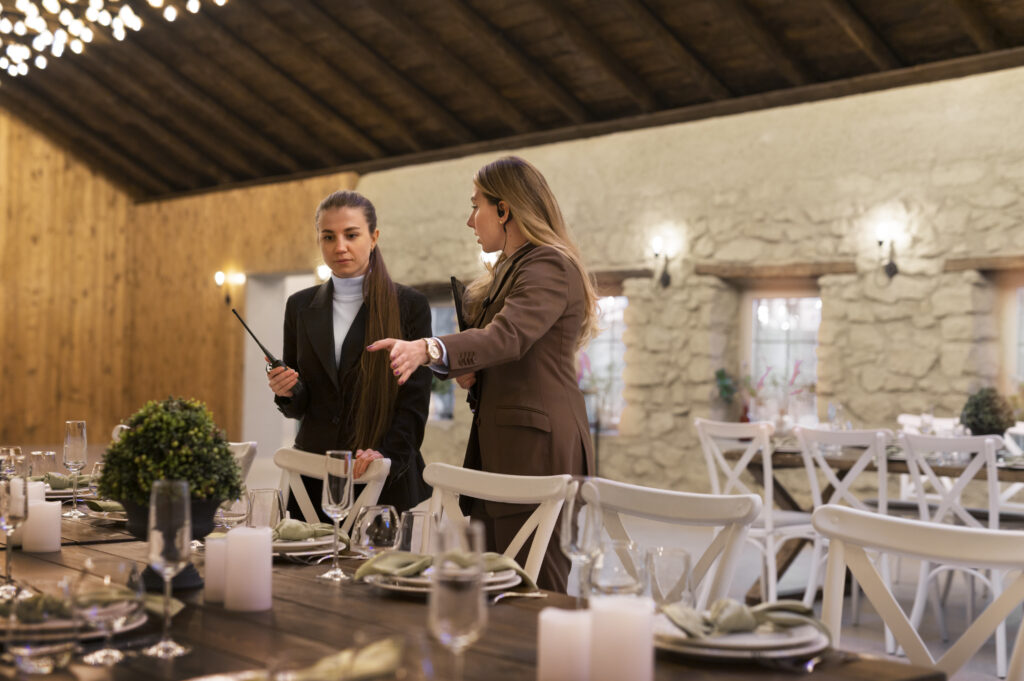Want to build your career as a wedding planner
Planning a wedding can be an overwhelming task, especially for beginners who have little to no experience in the wedding planning industry. However, with the right knowledge and resources, navigating this industry can be a rewarding and fulfilling experience. In this beginner’s guide, we will explore the key aspects of the wedding planning industry and provide valuable insights to help you get started on your journey.
Understanding the Wedding Planning Industry
Before diving into the world of wedding planning, it is essential to have a clear understanding of the industry as a whole. The wedding planning industry encompasses a wide range of professionals and services that play a vital role in creating unforgettable wedding experiences.
Weddings are one of the most significant events in a person’s life, and they require meticulous planning and attention to detail. From the moment a couple gets engaged to the day they say “I do,” there are numerous decisions to be made and tasks to be completed. This is where wedding planners come in.
Wedding planners are the backbone of the wedding planning industry. They are skilled professionals who assist couples in turning their wedding dreams into a reality. They provide guidance, expertise, and support throughout the entire planning process, ensuring that every aspect of the wedding is carefully thought out and executed.
Key Players in the Wedding Planning Industry
Several key players contribute to the success of a wedding. These include wedding planners, venues, caterers, photographers, florists, and entertainment providers. As a beginner, it is crucial to research and familiarize yourself with these professionals to determine how you can collaborate and create a cohesive wedding team.
Venues play a crucial role in setting the stage for a couple’s special day. They provide the space and ambiance that will leave a lasting impression on the couple and their guests. From elegant ballrooms to rustic barns, there is a wide variety of venues to choose from, each offering its unique charm and character.
Caterers are responsible for creating delicious and memorable meals that will satisfy the taste buds of the couple and their guests. They work closely with the couple to design a menu that reflects their preferences and dietary restrictions. From mouthwatering appetizers to decadent desserts, caterers play a vital role in ensuring that everyone leaves the wedding with a satisfied palate.
Photographers and videographers capture the precious moments of a wedding, allowing the couple to relive their special day for years to come. They have the skill and creativity to capture the emotions, joy, and love that fill the air during a wedding. Their work is a tangible reminder of the love and commitment shared between two individuals.
Florists add beauty and elegance to a wedding with their stunning floral arrangements. From bouquets to centerpieces, they have the ability to transform any space into a floral wonderland. Their expertise in selecting the perfect blooms and arranging them in a visually pleasing way is essential in creating a cohesive and visually stunning wedding design.
Entertainment providers, such as DJs and live bands, set the mood and keep the energy high throughout the wedding reception. They have the ability to read the crowd and play music that will get everyone on their feet and dancing the night away. Their role is crucial in creating a fun and memorable atmosphere for the couple and their guests.
Current Trends in Wedding Planning
The wedding industry is constantly evolving, with new trends emerging each year. Staying up to date with the latest trends can help you offer unique and personalized wedding experiences to your clients. From eco-friendly weddings to intimate micro-weddings, understanding and incorporating current trends can set you apart from the competition.
Eco-friendly weddings have gained popularity in recent years as couples become more conscious of their environmental impact. From using sustainable materials for invitations and decor to opting for locally sourced and organic food, eco-friendly weddings aim to reduce waste and promote sustainability.
Micro-weddings, on the other hand, have become a popular choice for couples who prefer a more intimate celebration. These weddings typically have a smaller guest count, allowing the couple to focus on creating meaningful connections with their loved ones. Micro-weddings often take place in unique and non-traditional venues, adding an element of exclusivity and intimacy to the event.
The Economic Impact of the Wedding Industry
The wedding industry not only creates memorable celebrations but also has a significant economic impact. Weddings generate substantial revenue, contributing to the growth of various businesses and local economies. Understanding the economic aspects of the industry can help you make informed decisions when planning and pricing your services.
Weddings require the services of numerous professionals, from wedding planners to caterers, photographers, and florists. These professionals rely on weddings for their livelihood, and the demand for their services creates job opportunities and stimulates economic growth.
Additionally, weddings often involve spending on various goods and services, such as wedding attire, jewelry, transportation, and accommodations. This spending contributes to the local economy, supporting businesses and creating a ripple effect of economic activity.
Furthermore, weddings attract tourists and destination weddings can have a significant impact on the tourism industry. Couples and their guests often travel to different locations to celebrate their special day, bringing in revenue for hotels, restaurants, and local attractions.
In conclusion, the wedding planning industry is a dynamic and thriving sector that involves a wide range of professionals and services. Understanding the key players, staying updated with current trends, and recognizing the economic impact of weddings are essential for success in this industry. By providing exceptional services and creating unforgettable experiences, wedding planners can contribute to the joy and happiness of couples on their special day.
Starting Your Journey in Wedding Planning

Now that you have a basic understanding of the wedding planning industry, it’s time to embark on your own journey as a wedding planner. Here are some essential steps to get you started.
Essential Skills for Wedding Planners
Successful wedding planners possess a variety of skills that contribute to their ability to create unforgettable weddings. These skills include excellent organizational abilities, effective communication, and negotiation skills, attention to detail, and creative problem-solving. As a beginner, honing these skills will be crucial for your success in the industry.
Training and Certifications for Wedding Planners
While formal education is not always required, acquiring training and certifications can provide you with valuable knowledge and credibility in the wedding planning industry. Several organizations offer professional training programs and certifications specifically designed for wedding planners. Consider investing in these programs to enhance your skills and gain a competitive edge.
Building Your Network in the Wedding Industry
Building a strong network of professionals in the wedding industry is essential for success. Attend industry events, join professional associations, and actively seek collaborations with photographers, venues, caterers, and other wedding service providers. Networking allows you to tap into a wider pool of resources and establish partnerships for future projects
The Business Side of Wedding Planning
As a wedding planner, it is crucial to understand the business side of wedding planning to ensure long-term success. Here are some important aspects to consider.
Creating a Business Plan for Your Wedding Planning Business
Developing a solid business plan is the foundation for any successful business. Consider factors such as target market, pricing structure, marketing strategies, and financial projections. A well-crafted business plan will help you stay focused, make informed decisions, and set achievable goals for your wedding planning business.
Marketing Strategies for Wedding Planners
Effective marketing is key to attracting clients and establishing your brand in the wedding planning industry. Utilize online platforms, social media, and traditional advertising methods to reach your target audience. Showcase your previous work and leverage positive client testimonials to build trust and credibility.
Managing Finances in the Wedding Planning Business
Financial management is crucial for the sustainability of your wedding planning business. Create a system for tracking expenses, invoicing clients, and managing cash flow. Consider investing in accounting software or consulting with a financial advisor to ensure proper financial management practices.
Overcoming Challenges in Wedding Planning
Like any industry, wedding planning comes with its fair share of challenges. Here are some common challenges you may encounter and how to overcome them.
Dealing with Difficult Clients
Difficult clients are an inevitable part of any service-oriented business. Stay calm, empathize with their concerns, and find solutions that meet their expectations. Effective communication and conflict resolution skills will be crucial in navigating challenging client situations.
Managing Unexpected Situations

Weddings can often be unpredictable, and unexpected situations can arise. Develop contingency plans for various scenarios such as bad weather, vendor cancellations, or logistical challenges. Being prepared and adaptable will help you handle these situations and ensure a seamless wedding experience for your clients.
Balancing Creativity and Practicality in Wedding Planning
Wedding planning involves finding a balance between the creative vision of the couple and the practical aspects of executing the event. Listen to your clients’ ideas and provide practical advice to ensure their vision is achievable within their budget and logistical constraints. Flexibility and creativity will help you create beautiful weddings while staying within the bounds of reality.
Navigating the wedding planning industry as a beginner may seem daunting, but with the right knowledge and determination, you can thrive in this rewarding field. By understanding the industry, honing your skills, and embracing the business side of wedding planning, you can create unforgettable wedding experiences for your clients and establish yourself as a trusted professional in the industry.

